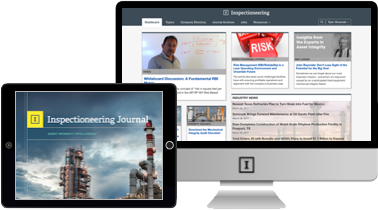Editor’s Note: The API RP 751 Section 6 Technical Advisory Group (part of API CRE SCIMI) has held meetings to clarify the 5th Edition inspection intervals, including the use of RBI to extend those intervals (the subject of this article). Changes are expected to be made concerning this particular section of the recommended practice which should help clarify and reinforce the intent of the new edition. We do not anticipate the addendum to be ready for public review until next year at the earliest.
Introduction
The purpose of this article is to help clarify where risk-based inspection (RBI) can be used to extend inspection intervals for piping and equipment in an HF Alkylation Unit, and where it is prohibited, based on the current 5th Edition of API RP 751, Safe Operation of Hydrofluoric Acid Alkylation Units (August 2021). Also provided are a few specific areas that are technically permitted by RP 751 to use RBI, but which may not be advisable and are included in the interest of completeness.
As compared to previous editions of API RP 751, the 5th Edition has significant changes and is much more prescriptive with regard to the use of RBI, allowing it in certain portions of the unit and disallowing it in others. The restrictions are experience-based, limiting the use of RBI in services where corrosion rates may be difficult to predict, highly localized, or where intended or unintended changes in operation may have a significant impact on corrosion or fouling.
One example of this philosophy, as highlighted in the summary below, is the requirement to perform internal inspection of specific equipment at every turnaround where there is a potential for localized corrosion for which external inspection (on-stream inspection) is not believed to be effective in reducing risk to an acceptable level. This applies to all Fractionator tower top sections together with their overhead drums and overhead condensers and coolers.
An important related issue is where limitations apply to the extension of inspection intervals for piping and equipment that have been exposed to a water-based chemical cleaning/neutralization. These procedures are known to generate sludge and deposits which can lead to plugging and fouling, as well as under-deposit corrosion, making it difficult to reliably predict the impact on corrosion rates.
The latest API RP 751 inspection requirements vary by location within the unit based primarily on the operating conditions in a particular stream, combined with an experience-based approach where different types of corrosion of varying severity and/or unpredictability have been observed in the industry. These different types of services are now referred to as “Corrosion Zones.” Each of the five (5) Corrosion Zones is intended to define distinctly different corrosion regimes in various parts of the HF Alkylation Unit with particular focus on the characteristics of the HF acid phase within each Zone (i.e., dilute HF, condensing HF, concentrated HF, etc.).
It is noteworthy that the terms “main acid”, “trace acid” and “dilute HF acid” have been discontinued in the 5th Edition in favor of the Corrosion Zones.
The following information summarizes where RBI can be used to increase inspection intervals based on RP 751. It is strongly recommended that the reader refer to the API 751 Corrosion Zone Diagram of a generic HF Alkylation Unit shown in Figure 1.

















Comments and Discussion
Add a Comment
Please log in or register to participate in comments and discussions.